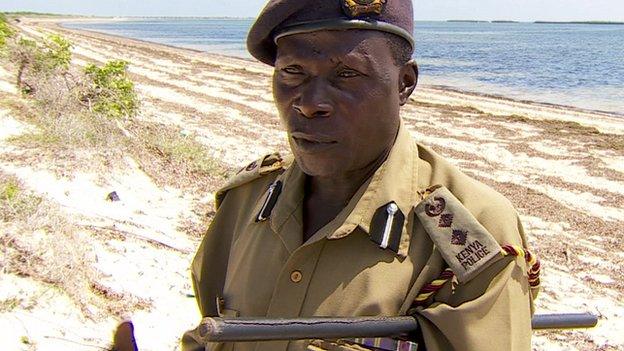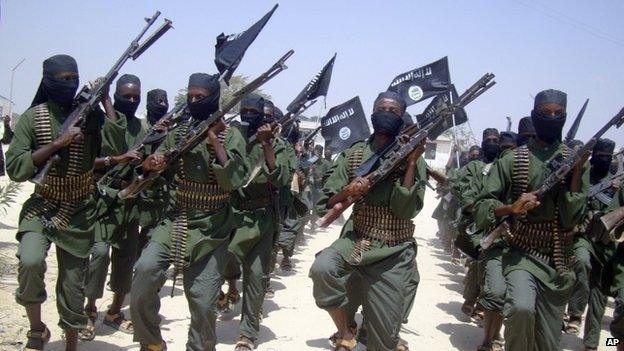Kenya's anti-terror forces face accusations after Westgate
- Published

The attack on the Westgate shopping centre in Nairobi in September has drawn attention to tensions in Kenya - and now the country's security services, funded by the UK and the US, stand accused of carrying out "pre-emptive" killings of suspected radicals, writes the BBC's Gabriel Gatehouse.
Kiunga is Kenya's final frontier and Superintendent Samuel Obara has one of the toughest jobs in the police force.
"Even the al-Shabab are now escaping from Somalia and trying to penetrate into Kenya," he says, standing on a strip of no-man's land between the two countries on the Indian Ocean coast.
When Kenya invaded Somalia two years ago, it took the fight to al-Shabab, the Islamist militant group with links to al-Qaeda, which still controls large areas of southern Somalia.
The invasion was supposed to make Kenya safer. And to some extent it has. Mr Obara waves his arm over the acres of coast and scrubland he and his men patrol that in the past, he points out, would come under attack.
But he admits his force is under-equipped and under-staffed.
"Porous the way the border is, I am sure people must be penetrating without our catching [them]."
Indeed, it was somewhere here, security officials believe, the four men believed to be responsible for the attack on the Westgate shopping mall in Nairobi slipped across the border into Kenya.
Many of the details of the attack remain a mystery. But a picture is beginning to emerge of a bungled security operation and a frustrated Kenyan police force, funded by the West, lashing out at those they see as a threat.
Gabriel Gatehouse reports for Newsnight on the questions post-Westgate
On the day of the attack, there was chaos. It took the security forces 90 minutes to arrive at the scene, by which time many of the 67 people who lost their lives had already been killed.
But by mid-afternoon, teams from the Kenyan Paramilitary police (the GSU), appeared to have the attackers pinned down at the back of the building.
Until the army arrived. That, says former GSU officer George Musamali, is when things started to go wrong.
Dead or alive?
"Each unit was coming in with its own command. The operation was bungled," he says.
"The GSU was effectively handling the situation. But when the army came, everybody else was kicked out, and this is where the operation started going badly."
Forensic investigators say they have retrieved the remains of three or four individuals, which they believe belong to the bodies of the attackers. The remains are being tested but have yet to deliver a positive DNA match.
After the New York Police Department (NYPD) sent officers to Nairobi to assist in the investigation, it said it is possible some or all of the gunmen could have escaped.
Mr Musamali, who maintains close links with Kenya's police and intelligence services, says some of his former colleagues agree with the NYPD.
"They also believe the attackers might have left the building. The intelligence services are telling me they slipped out of Westgate and left the country," he says.
At the moment, it is unclear whether the attackers are alive or dead.
In the early hours of 4 October, less than two weeks after the Westgate attack, a radical preacher by the name of Ibrahim "Rogo" Omar was shot dead as he travelled in a car on the outskirts of Mombasa, Kenya's second city.
He has not been officially linked to Westgate but his followers believe he was killed by a branch of the Kenyan police known as the Anti-Terror Police Unit (ATPU).
'Court frustrations'
Officially, the Kenyan police deny any involvement in his killing but, speaking on condition of anonymity, a serving member of the Anti-Terror Police Unit said the ATPU was behind the shooting.
"The justice system in Kenya is not favourable to the work of the police," he said.
"So we opt to eliminate them. We identify you, we gun you down in front of your family, and we begin with the leaders."
Mr Omar's case appears in a report by the Kenyan non-governmental organisation Muslims for Human Rights, detailing dozens of instances of extra-judicial killings, disappearances, torture and rendition allegedly carried out by the ATPU, external, which receives funding and training from the United States and the UK.
"They want to impress the British, they want to impress the Americans, because they are getting funding," says Francis Auma, who compiled the report.
The ATPU did not respond to BBC requests for an interview. In a statement, the UK Foreign Office said it took allegations of human rights abuse very seriously.
It added: "The UK has significant interests in Kenya. We consider that there is a threat to these interests, as demonstrated by the recent attack on the Westgate shopping centre, and to the UK mainland - primarily from foreign fighters in the East Africa region - a significant number of whom have UK links.
"We are working with the authorities to tackle this threat and to support the rule of law in Kenya."

Al-Shabab has been forced out of Somalia's large settlements but still carries out suicide attacks
Mr Musamali says many involved in counter-terrorism in Kenya feel that the country's legal system is hampering their efforts.
"If police are involved in this, I believe it is out of frustration.
"They have specific facts and probably they know this person is involved in terrorism. But you take him to court and tomorrow he is out on bond, doing the same things."
Few doubt that Kenya has a problem with radicalisation.
Muslim cleric Abubakar Shariff Ahmed, who is known more commonly as Makaburi and appears on UN and US sanctions lists accused of recruiting young Kenyan Muslims for violent militant activity in Somalia - a charge he denies, says Kenyan security services are systematically targeting those they perceive as a threat.
"They are pre-empting attacks by killing anybody who has the potential to do an attack or who they think has the potential to instigate an attack."
But are the security services targeting the right people?
"Maybe yes but mostly no," Makaburi thinks.
"I know they are going to kill me. But I do not fear for my safety. I am a true Muslim. I believe that my life and death is in the hands of Allah."
And police efforts to combat radicalisation appear to be having the opposite effect in a run-down part of Nairobi known as Majengo.
"They are killing us," one young man told me, who along with others complained that anyone of Somali origin or of the Muslim faith was suspected of being a member of al-Shabab. All denied knowing anyone who had joined the militant group.
"But there is no problem if they join al-Shabab or al-Qaeda," said Ahmed Abdurahman, a 20-year-old student, adding that it was a way of providing money for their families if they were unemployed.